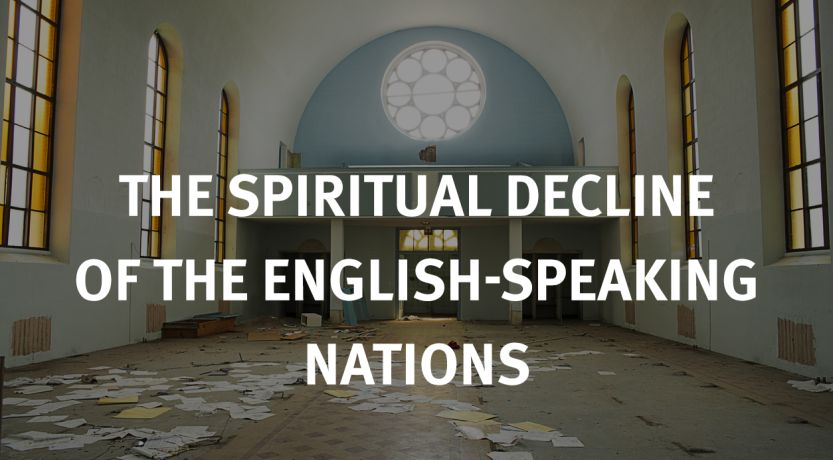The Spiritual Decline of the English-Speaking Nations
Ancient Israel went into captivity for its national sins. Are the United Kingdom and United States making the same mistakes? And what should you do about it?

The English-speaking nations have undergone drastic changes in recent years. These changes have caused a great deal of division and left many with a sense of uncertainty. Many commentators look at these nations, especially the United States, and see signs of national decline. It seems we are seeing the weakening of the U.S.-led order that has maintained relative world peace since World War II.
From a biblical perspective, there is cause for alarm. Students of the Bible understand that the fall of ancient Israel and Judah was preceded by a dramatic spiritual and moral decline. We should be alarmed that many of these same problems are playing out in the modern descendants of those ancient nations. (To learn more about the biblical origins of these two nations, read “Who Are the United States and Britain in Prophecy?”)
Let’s take a look at some of the alarming examples of the spiritual decline of the United States and Britain.
Abandoning their beliefs
The people of the ancient nation of Judah were rebuked for abandoning belief in God and putting their faith in things that could not save them. So, God asked them through the prophet Jeremiah, “Has a nation changed its gods?” (Jeremiah 2:11). God continued by accusing them of committing two great evils—forsaking God and putting their faith in things that couldn’t save them (verse 13).
The value system of English-speaking nations has drastically changed since World War II.
The value system of English-speaking nations has drastically changed since World War II. The 1960s counterculture movement probably caused the most significant social and cultural shifts in the history of these nations. That era opened the floodgates for more changes in the ensuing decades.
As a result, new attitudes and beliefs have become prominent about sex, drugs, the family, marriage, child rearing, gender, education and religion (particularly Christianity).
Consider the following:
Homosexuality has been normalized, accepted and celebrated. In previous years, homosexuality was generally seen as taboo. It was deemed as an “unnatural offense” and immoral. But within the last seven decades, homosexuality has been normalized and accepted as simply an orientation. Today Western nations have redefined marriage to include homosexuality, something that was, not long ago, unthinkable.
The Bible declares homosexuality as an aberration to God’s design of sexuality (Leviticus 18:22; Romans 1:26-27; 1 Corinthians 6:9).
To learn more about God’s view on this topic, read “God’s Problem With Same-Sex Marriage.”
In the 1960s, societal attitudes toward drug use also radically changed. Taking mind-altering substances became popular, and was even glorified, in the 1960s. Since then, drug proliferation has drastically increased, resulting in the drug epidemics we see in the United States. Attitudes toward punishment of drug use have changed so much that some cities have created safe injection sites to help promote safer drug use. But the negative consequences of drug use are easy to see. Many urban areas now have tent cities of indigent people, many of whom are in that circumstance partly because of drug addiction. Drug use and the resulting crime have contributed to making many cities unsafe, and the problem is continuing to worsen.
The Bible teaches that we are to take care of our bodies (1 Corinthians 6:19-20), maintain sober minds (1 Timothy 3:2) and exercise self-control (2 Peter 1:6). Instead of glorifying addictive behavior, we are to fight and overcome it.
To learn more about how to do that, read our article “Confronting Addiction.”
Views on heterosexual sex have experienced major changes. The advent of the birth control pill and the legalization of abortion have led people to feel liberated to engage in sex outside of marriage. This has led to a society that glories in consequence-free sex. Sexual relationships before marriage have become the norm. But a consequence of this trend has been dramatic increases in sexually transmitted diseases, especially among the youth. The Centers for Disease Control estimates that almost half of the 26 million new infections in the U.S. in 2018 were in people between the ages of 15 and 24.
As the structure and definition of a family changed, the stability of traditional marriages has broken down.
As the structure and definition of a family changed, the stability of traditional marriages has broken down. No-fault divorces and infidelity caused a rise in divorce. More recently, divorce rates have declined—mainly because more are choosing to live together without marrying. As a result, millions of children are raised in single-parent families, particularly fatherless families.
The prophet Jeremiah rebuked the people of ancient Judah for their sexual promiscuity (Jeremiah 5:8; 13:27).
To learn more about these problems, read “Fighting the Works of the Flesh: Sex Outside of Marriage.”
English-speaking nations are becoming less and less religious. And it shows. Churches around the world are being closed and sold to businesses that convert them for other uses. For example, the historic All Saints Church in New York City was recently sold to a real estate developer after being shuttered in 2015 due to dwindling attendance (the church was built to house 1,200 worshippers). This is emblematic of declining church attendance in Western nations.
For the first time since Gallup began tracking U.S. church attendance, church membership has dropped below 50 percent. From 1937 to around the turn of the century, church membership remained near 70 percent and then started a steady decline.
The polling shows that half of the decline is due to the rise of the “nones,” the fastest-growing religious group in America. “Nones” refers to those who do not affiliate with any religion. From just before the turn of the century, the “nones” have risen from 8 percent to 21 percent.
The apostle Paul warned that denying God leads to unsound thought patterns and harmful behaviors (Romans 1:26-31). The prophet Hosea echoed the same sentiment: “My people are destroyed for lack of knowledge . . . Because you have forgotten the law of your God, I also will forget your children” (Hosea 4:6).
To learn more about this trend, read “Why the Decline of Christianity?”
Broken foundations
As we stated above, ancient Israel went through similar conditions. God warned that if they forgot and rejected Him and His laws, especially when times were good, He would punish them (Deuteronomy 8:17-20). There are consequences for outright rejection of God’s laws—and our modern nations will face those consequences.
The book of Psalms asks, “If the foundations be destroyed, what can the righteous do?” (Psalm 11:3). It’s a good question. As our society rejects the basics and foundations of God’s Word, it is vital for Christians to strengthen their foundations.
Students of the Bible know that things will “grow worse and worse,” especially as we head closer to the end times (2 Timothy 3:13). Until then, we are told to “wait for the LORD” (Proverbs 20:22). Even if our nations refuse to change direction and repent, we can change ourselves and continue to repent of our personal sins.
Date Posted: April 15, 2021



